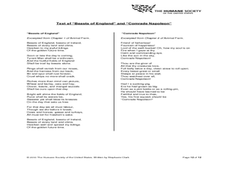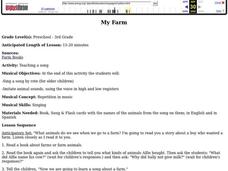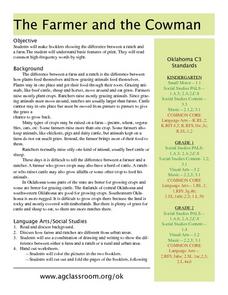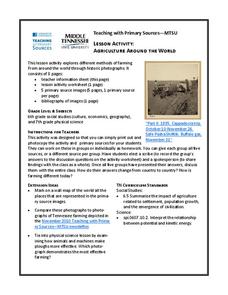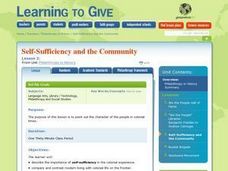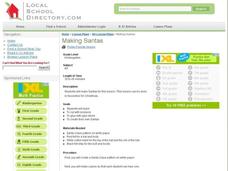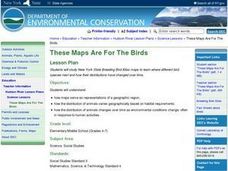Curated OER
Animal Farm - The Rest of the Story
Young scholars participate in a reader's theater using farm animals in the novella Animal Farm. In this Animal Farm lesson plan, students evaluate interpretations using the text, personal experience, and historical events.
Redefining Progress
Have and Have-Not
Is there a correlation between a country's wealth and the extent of its ecological footprint? What exactly constitutes an ecological footprint, and how does one country stack up against the rest? This is a unique lesson to incorporate...
Curated OER
My Farm
Young scholars explore repetition in music. In this music lesson, students discover the lyrics of a folk song from Argentina about farm animals. Young scholars read about farms and the animals found on farms prior to learning the song in...
Curated OER
Farm Babies
Students use flash cards to match the mother names to the baby names for farm animals. In a designated "barn" in the room, students simulate being mothers, fathers, and babies. The baby must find his mother and father. Students visit...
Curated OER
Back to the Farm
Students complete a family tree. In this farming and ranching lesson, students define the term genealogy, learn how to create a family tree, and fill in a family tree with the help of their parents making sure to note if any of their...
Roy Rosenzweig Center for History and New Media
American Indians and their Environment
People could take a page in ingenuity and survival from the Powhatans. Deer skins became clothes, and the members of the Native American group farmed the rich Virginia soil and hunted in its forests for food. Using images of artifacts...
Curated OER
Animal Rights Vs. Animal Welfare - Understanding the Issue
Students explore the difference between animal rights and animal welfare. They take a field trip to a farm to explore the producing animals for human use. After researching and collecting information from animal welfare/rights...
Curated OER
The Farmer and the Cowman
What is the difference between a ranch and a farm? After reading and discussing the provided background information, young agriculturalists will color, cut, and create neat little booklets that show the differences between ranches and...
Curated OER
Farm Census
Students disuss the work of a farmer. They recognize and name farm animals to represent the information in a pictogram.
Curated OER
Animals on a Rice Farm
Students investigate animals that live on a rice farm. In this farm lesson, students discover the animals that live on a rice farm. Students also explore the machines that farmers need. Students do a fill in the blank activity.
Curated OER
Agriculture Around the World
Students explore various kinds of farming methods around the world. In this history lesson, students view pictures of farming methods, then compare and contrast them in a class discussion with the methods of farming that are used today.
Curated OER
Ecuadorian Highlands Lesson
Indigenous peoples resided in the highlands of Ecuador as far back as 5,000 B.C. To learn about the lives of these people, class pairs research the farming and the building methods, the arts and crafts, and the beliefs of the early...
Curated OER
Farms And Cities
Students differentiate the differences of living on a farm or in a city. They do this with the use of coloring pictures and have group discussion about each picture to identify characteristics and identify where the picture is from. The...
Curated OER
Down on the Farm
Students are introduced to a map of an Illinois farm. They determine whether the map is of the past, present, or future by looking at features on the map. They also use the map to make a three-dimensional model.
Curated OER
Better Butter
Students explore the process of making butter. In this agriculture lesson, students discuss how butter is made today and how it was made in the past. Students make their own butter using baby food jars and some "elbow grease."
Curated OER
Philanthropy in History Lesson 3: Self-sufficiency And the Community
Students study the characteristic of self-sufficiency in people that lived during Colonial times. They investigate the contemporary movement of Habitat for Humanity. They listen to the story of Donald Hall's, The Oxcart Man and write a...
Curated OER
Making Santas
Students construct Santas. In this holiday lesson, students demonstrate how to cut with scissors and glue with glue sticks to create their own Santas from paper and felt. Students work on developing their fine motor skills.
Global Oneness Project
The Consciousness of Nature
Scholars voice their opinions about animal consciousness with an article that challenges common ideas about nature. After reading the article, learners engage in a thoughtful discussion before writing out their arguments in a persuasive...
Curated OER
These Maps are for the Birds
Learners identify and study New York State Breeding Bird Atlas maps to learn where different bird species nest and how their distributions have changed over time. They also identify how maps serve as representations of a geographic...
Curated OER
Our Own City
Students will construct their own functioning city. Each day students will add to the city requiring adjustments and planning. They solve problems caused by increase in human settlement such as stacking houses creating apartments so that...
Curated OER
Why Eat Organic?
Ninth graders explore the concept of organic eating. In this environmental stewardship lesson, 9th graders compare and contrast organic foods with conventional foods and discuss the benefits of eating organic foods.
Curated OER
The Cox and Gossner Family Histories
Eleventh graders investigate the relationship between physical geography and Utah's settlement , land use, and economy. In this Geography lesson, 11th graders examine the interrelationship between Utah's climate. Students assess how...
Curated OER
Music of the Estuary
Students explore the sounds of the estuary. In this wetlands lesson, students discuss how to simulate the sounds of nature. Students write and record a musical score featuring the sounds of the wetlands.
Curated OER
Making Valentine's Day Cards
Students construct Valentine's Day cards. In this holiday lesson, students use felt, construction paper, markers, and glue to create unique Valentine's Day cards.
Other popular searches
- Farm Animals Lesson Plan
- Farm Animals Lesson Literacy
- Farm Animals Lesson Math
- Farm Animals Lesson Crafts


